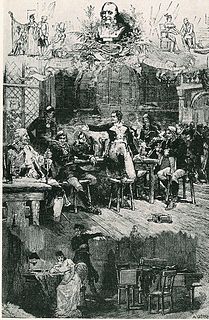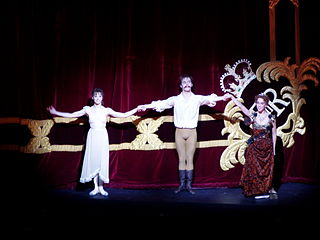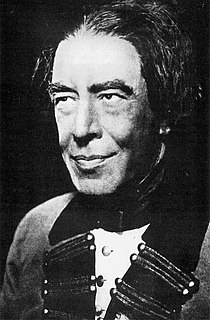
Sir John Falstaff is a fictional character who appears in three plays by William Shakespeare and is eulogized in a fourth. His significance as a fully developed character is primarily formed in the plays Henry IV, Part 1 and Part 2, where he is a companion to Prince Hal, the future King Henry V of England. A notable eulogy for Falstaff is presented in Act II, Scene III of Henry V, where Falstaff does not appear as a character on stage, as enacted by Mistress Quickly in terms that some scholars have ascribed to Plato's description of the death of Socrates after drinking hemlock. By comparison, Falstaff is presented as the buffoonish suitor of two married women in The Merry Wives of Windsor.

No Exit is a 1944 existentialist French play by Jean-Paul Sartre. The original title is the French equivalent of the legal term in camera, referring to a private discussion behind closed doors. The play was first performed at the Théâtre du Vieux-Colombier in May 1944. The play begins with three characters who find themselves waiting in a mysterious room. It is a depiction of the afterlife in which three deceased characters are punished by being locked into a room together for eternity. It is the source of Sartre's especially famous phrase "L'enfer, c'est les autres" or "Hell is other people", a reference to Sartre's ideas about the look and the perpetual ontological struggle of being caused to see oneself as an object from the view of another consciousness.

Alcina is an opera seria by George Frideric Handel. Handel used the libretto of L'isola di Alcina, an opera that was set in 1728 in Rome by Riccardo Broschi, which he acquired the year after during his travels in Italy. Partly altered for better conformity, the story was originally taken from Ludovico Ariosto's Orlando furioso, an epic poem. The opera contains several musical sequences with opportunity for dance: these were composed for dancer Marie Sallé.

Semele is a 'musical drama', originally presented "after the manner of an oratorio", in three parts by George Frideric Handel. Based on a pre-existent opera libretto by William Congreve, the work is an opera in all but name but was first presented in concert form at Covent Garden theatre on 10 February 1744. The story comes from Ovid's Metamorphoses and concerns Semele, mother of Bacchus. Handel also referred to the work as 'The Story of Semele'. The work contains the famous aria Where'er you walk.

Pagliacci is an Italian opera in a prologue and two acts, with music and libretto by Ruggero Leoncavallo. It is the composer's only opera that is still widely performed. Opera companies have frequently staged Pagliacci with Cavalleria rusticana by Pietro Mascagni, a double bill known colloquially as "Cav and Pag".

The Tales of Hoffmann is an opéra fantastique by Jacques Offenbach. The French libretto was written by Jules Barbier, based on three short stories by E. T. A. Hoffmann, who is the protagonist of the story. It was Offenbach's final work; he died in October 1880, four months before the premiere.

Les Huguenots is a French opera by Giacomo Meyerbeer and is one of the most popular and spectacular examples of grand opera. In five acts, to a libretto by Eugène Scribe and Émile Deschamps, it premiered in Paris in 1836.

Beethoven's Last Night is a rock opera by the Trans-Siberian Orchestra, released in 2000. The album tells the fictional story of Ludwig van Beethoven on the last night of his life, as the devil, Mephistopheles, comes to collect his soul. With the help of Fate and her son Twist, Beethoven unwittingly tricks the devil and is allowed to keep his soul which he had thought lost, but that the devil had no claim on. The album is a rock opera featuring many classical crossover rock songs which are clearly based on melodies from classical music, particularly Beethoven's works. It is the first Trans-Siberian Orchestra album that does not feature Christmas themes. The original cover art was created by Edgar Jerins, and re-issued cover art was created by Greg Hildebrandt.
Cleopatra's Night is a short opera in two acts by American composer Henry Kimball Hadley. Its libretto is by Alice Leal Pollock based on a short story by French author Théophile Gautier. The opera premiered at the Metropolitan Opera on January 31, 1920. The opera was revived the following season, and was broadcast on NBC radio in 1929.
Azora, The Daughter of Montezuma is an opera in 3 acts by American composer Henry Kimball Hadley to a libretto in English by author David Stevens.
La Périchole is an opéra bouffe in three acts by Jacques Offenbach. Henri Meilhac and Ludovic Halévy wrote the French libretto based on the 1829 one act play Le carrosse du Saint-Sacrement by Prosper Mérimée, which was revived on 13 March 1850 at the Théâtre-Français. Offenbach was probably aware of this production, as he conducted the orchestra of the Comédie-Française from around this time. Another theatrical creation that pre-dates Offenbach's opéra bouffe and may have influenced the piece is a farce by Desforges and Théaulon given on 21 October 1835 at the Théâtre du Palais-Royal.
The Picture of Dorian Gray, op. 45, is an American opera in two acts and 12 scenes, with libretto and music by Lowell Liebermann, based on the 1890 novel of the same name by Oscar Wilde.

Henry Kimball Hadley was an American composer and conductor.
Safié is a one act opera by American composer Henry Kimball Hadley. The opera's libretto was written in English by Edward Oxenford, but its premiere, on April 4, 1909 in Mainz, Germany, was given in a German translation by Otto Neitzel. Hadley conducted the premiere, and the title role was sung by American soprano Marguerite Lemon.

Mayerling is a ballet choreographed by Kenneth MacMillan to the music of Franz Liszt, arranged by John Lanchbery, scenario by Gillian Freeman and designed by Nicholas Georgiadis. The ballet is based on the Mayerling incident, a series of events surrounding the apparent murder–suicide of Rudolf, Crown Prince of Austria and his lover, Baroness Mary Vetsera. The ballet premiered on 14 February 1978, at the Royal Opera House, danced by The Royal Ballet, with David Wall as Prince Rudolf and Lynn Seymour as Vetsera.
Bianca is a one act opera by American composer Henry Kimball Hadley. The opera's libretto was an English-language adaptation of Carlo Goldoni's comedy The Mistress of the Inn by Grant Stewart. Hadley finished the score in January, 1917, and entered it in a competition for the best American opera without chorus, for which William Wade Hinshaw offered a $1000 prize and a promise to produce the opera in New York City by the American Society of Singers. It won, and was produced on October 19, 1918, at the Park Theater in Manhattan, with the composer conducting, and soprano Maggie Teyte in the title role.

Dorothy "Doll" Tearsheet is a fictional character who appears in Shakespeare's play Henry IV, Part 2. She is a prostitute who frequents the Boar's Head Inn in Eastcheap. Doll is close friends with Mistress Quickly, the proprietress of the tavern, who procures her services for Falstaff.

The Mistress of the Inn, also translated as The Innkeeper Woman or Mirandolina, is a 1753 three-act comedy by the Italian playwright Carlo Goldoni about a coquette. The play has been regarded as his masterpiece. Frederick Davies describes it as Goldoni's Much Ado About Nothing.
One of Cleopatra's Nights is a historical short story by the French writer Théophile Gautier, first published as a six-part serial from November 29-December 6 1838 in La Presse. It relates an imagined romantic incident in the life of the Ptolemaic queen of Egypt, Cleopatra VII. The story was translated into English together with other fantastic tales of Gautier by Lafcadio Hearn for the collection One of Cleopatra's Nights and Other Fantastic Romances, published by Richard Worthington in 1882.

Le petit Faust is an opéra bouffe in four acts which burlesques the drama Faust by Goethe and the opera of the same name by Gounod. The music of the piece is by Hervé, with a text by Hector-Jonathan Crémieux and Adolphe Jaime. The work had its premiere in Paris at the Théâtre des Folies-Dramatiques on 23 April 1869.












